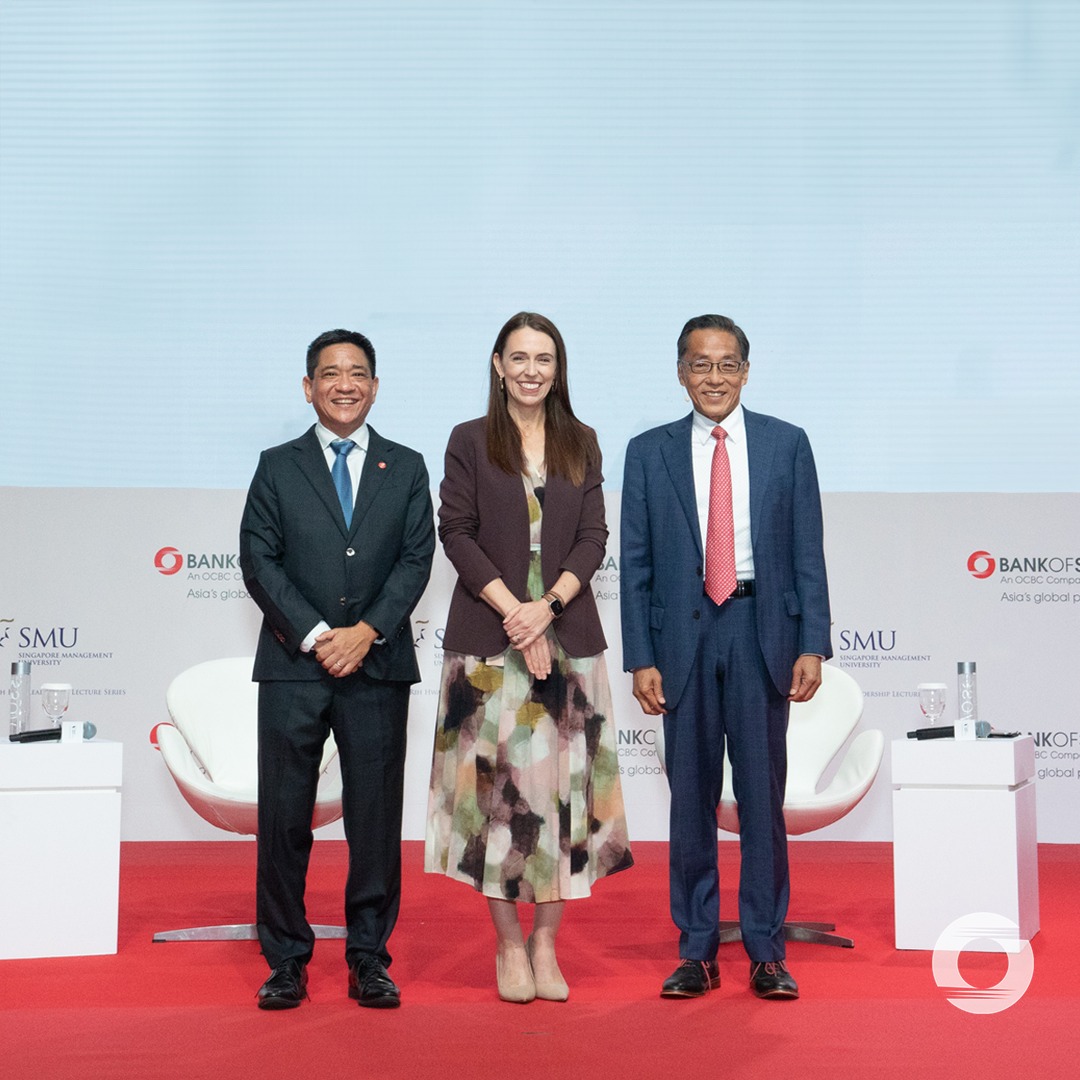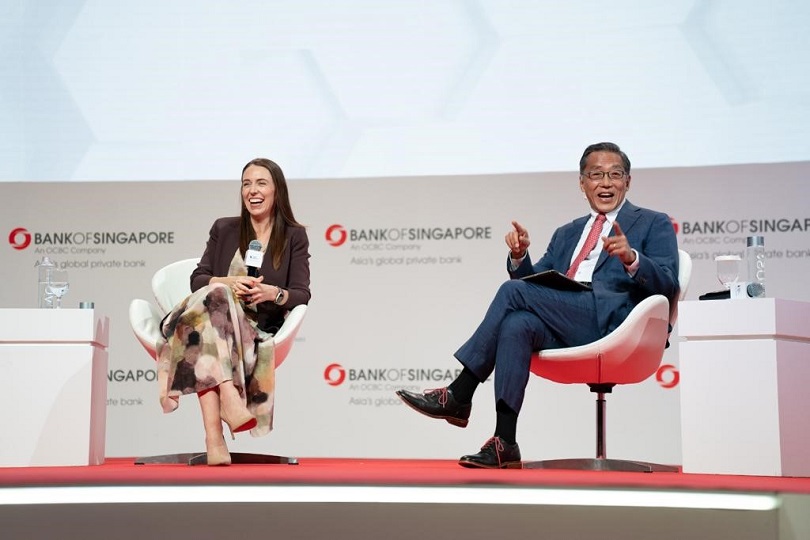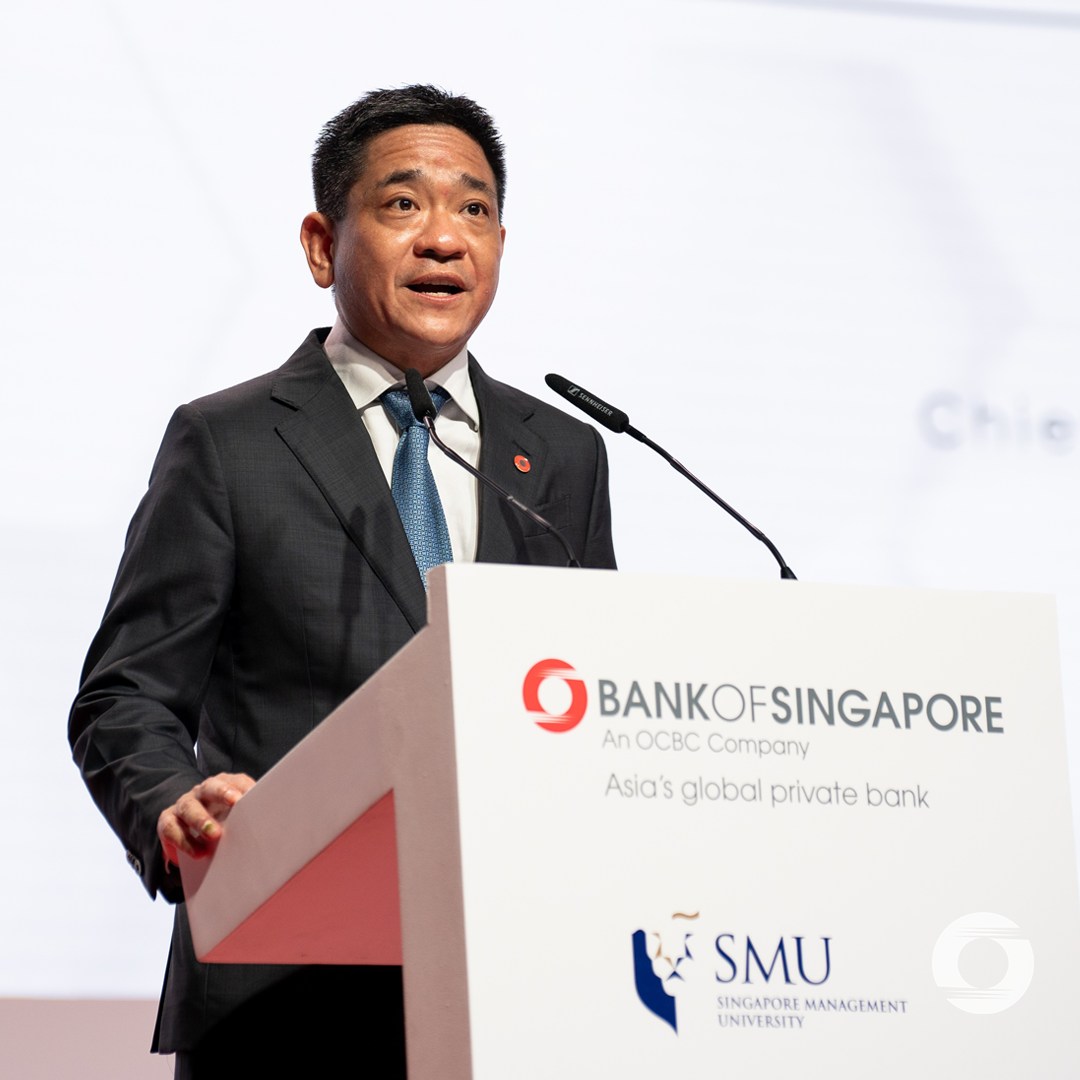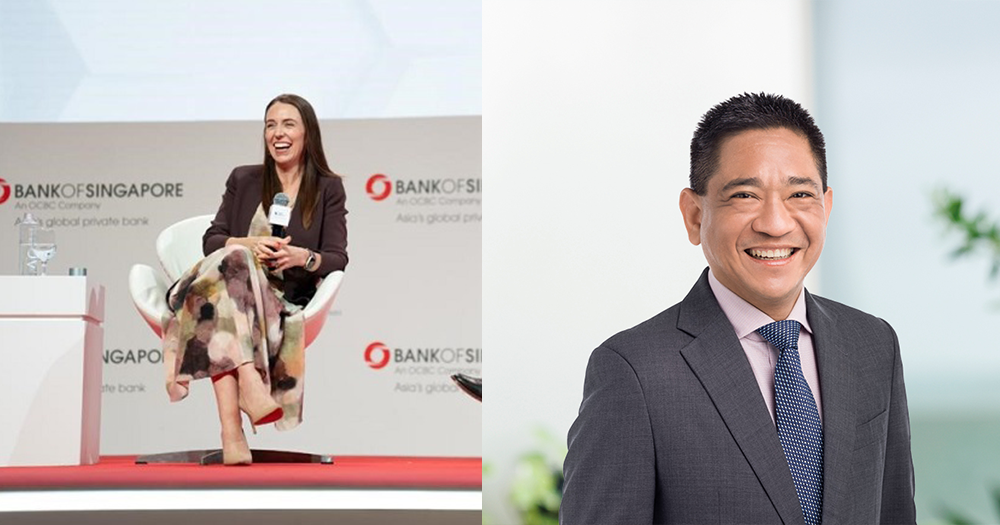On Nov. 8, Jason Moo met former New Zealand Prime Minister Jacinda Ardern.
It was at a closed-door event organised by Bank of Singapore — OCBC's private banking arm, which Moo helms — and the Singapore Management University.
In this reflective piece, Moo shared his takeaways from Ardern's sharing, including her thoughts on leadership, the next generation, and sustainability at the organisational level.
By Jason Moo
It is difficult for leaders to stamp their mark in the complex and fragmented world we live in today.
A series of major shocks and uncertainty have made guiding companies and economies through unprecedented change a challenge.
When it comes to this challenge, I have long admired former New Zealand Prime Minister Jacinda Ardern.
With great empathy but decisiveness, as well as optimism and focus, she steered her island nation through five years of tests, notably the Covid-19 pandemic and the Christchurch mosque shootings which shook the country in 2019.
It was my pleasure and privilege to meet her on the morning of 8 November. The honourable Dame Ardern took to the stage with Founding Chairman of the Board of Trustees of SMU, Ho Kwon Ping, for a Bank of Singapore and Singapore Management University (SMU) event.
 Photo from Bank of Singapore/Facebook
Photo from Bank of Singapore/Facebook
About 800 guests including our clients, representatives from the Financial Women's Association of Singapore and the Women Venture Asia, SMU students and media attended the event.
As she spoke, I was struck by her views on leadership, her strong opinions on what the next generation requires in order to succeed, and her mindset when it comes to managing sustainability at the organisational level.
Her values and beliefs came through clearly, and to me, they are marked by a philosophy grounded in what we might call “being human”.
Here are my takeaways from her candid sharing with us.
1. You do not have to be a ‘template leader’
I believe that leaders, at all levels, have a pivotal role to play in helping to steer the world on a path towards sustainable growth and inclusivity.
But they also have to be authentic in their approach. Dame Ardern described how we often have predisposed notions of what good leaders look like. There is a ‘template’ that we have in mind of what that is.
Dame Ardern spoke about how instead of trying to follow such notions, she was driven by traits like empathy and sensitivity – traditionally seen as weaknesses in leadership. Through such lenses, she was able to see policies from someone else’s perspective.
She described how in trauma or crisis, she would think of the needs of the victim in a way that made her job feel harder.
But she felt these tools helped her perform.
In fact, she inspired the world with compassionate leadership, which did nothing to dampen her commitment to progress.
In doing so, she demonstrated that being a good leader is actually about being a good human.
In her words: “My hope is that traits often painted as weaknesses will come to be valued as human. Kindness, curiosity, generosity, empathy – those traits of good humans will become the traits of good leaders as well.”
 Photo from Bank of Singapore/Facebook
Photo from Bank of Singapore/Facebook
It is my hope as well, as leadership today can mean different things to different people. As Dame Ardern pointed out, a leader can be anyone.
As they stay true to their selves, they bring fresh perspectives in inspiring change, fostering innovation, and creating a vision for a better future.
2. Politicians need to think of “double duty” as they plan for a sustainable world
Dame Ardern is a different type of national leader, and so it was no surprise that during her time in office, she expressed a vocal concern for a sustainable world.
Her strong stance on the need to prioritise climate action and a sustainable world came at a time when the world’s superpowers lacked leadership on the issue. It is a stance she continues today.
Politicians, said Dame Ardern, need to always think about “double duty” while focusing on the idea of growth and sustainability.
In this way, they can avoid bureaucracy and being tied down by challenges.
They should be thinking about reaping the benefits of a sustainable transition, while looking after the health and well-being of their populations.
An example she cited was for one of New Zealand’s responses to flooding. In 2021 and 2022, Dame Ardern had to deal with two incidences of severe flooding which hit New Zealand. Her government created more funding mechanisms, which created more jobs, she said.
A climate transition should not come with penalties, she said, adding that politicians must aim to always look for the benefits of green growth by constantly looking forward.
This is doing “double duty” and these two things should be in tandem, otherwise people will continue to see climate as a challenge that should be avoided, as opposed to an opportunity that should be grabbed whole-heartedly.
To my mind, the course of history is filled with examples of what we were able to achieve when we put our minds and collective resources to work.
There is much to be done but together, we do have the ability to harness the power of technology and AI to transform how we live, work, power our cities and future proof our food supplies.
These can be achieved if politicians and companies adopt Dame Ardern’s mindset of “double duty” of growing the sustainable transition, even as they safeguard the well-being of their people.
3. A message to the next generation: Stay curious and brave
The challenges we face today include some of the most fundamental structural shifts in history such as Asia and ASEAN’s rising prominence, the geopolitical contest between the US and China and the transition to a much more multipolar world.
As the war in Ukraine and Gaza has focused attention on geopolitical risk and the human cost of conflict, and has put globalisation under renewed scrutiny.
To address the challenges we face today, we need the active engagement and education of our youth. It is they who will bear the brunt of the decisions we make today.
Dame Ardern revealed what worries her as they seek to build a sustainable, liveable future world. “What worries me is if they lose their curiosity or their bravery,” she said.
But in the youth of today, I see hope. I observe in them a driving spark to learn about the world and its complexities and develop the skills to think critically, to question, and to innovate.
 Photo from Bank of Singapore/Facebook
Photo from Bank of Singapore/Facebook
To not lose heart, they need to “never stop being curious and never stop being brave,” said Dame Ardern.
We need both those qualities in equal measure, for it is the next generation’s job to dream of a better world, and our responsibility to equip them with the tools to build it.
As famous American writer Ernest Hemingway once said: “The world is a fine place, and worth fighting for”.
Top image from OCBC Bank
If you like what you read, follow us on Facebook, Instagram, Twitter and Telegram to get the latest updates.

